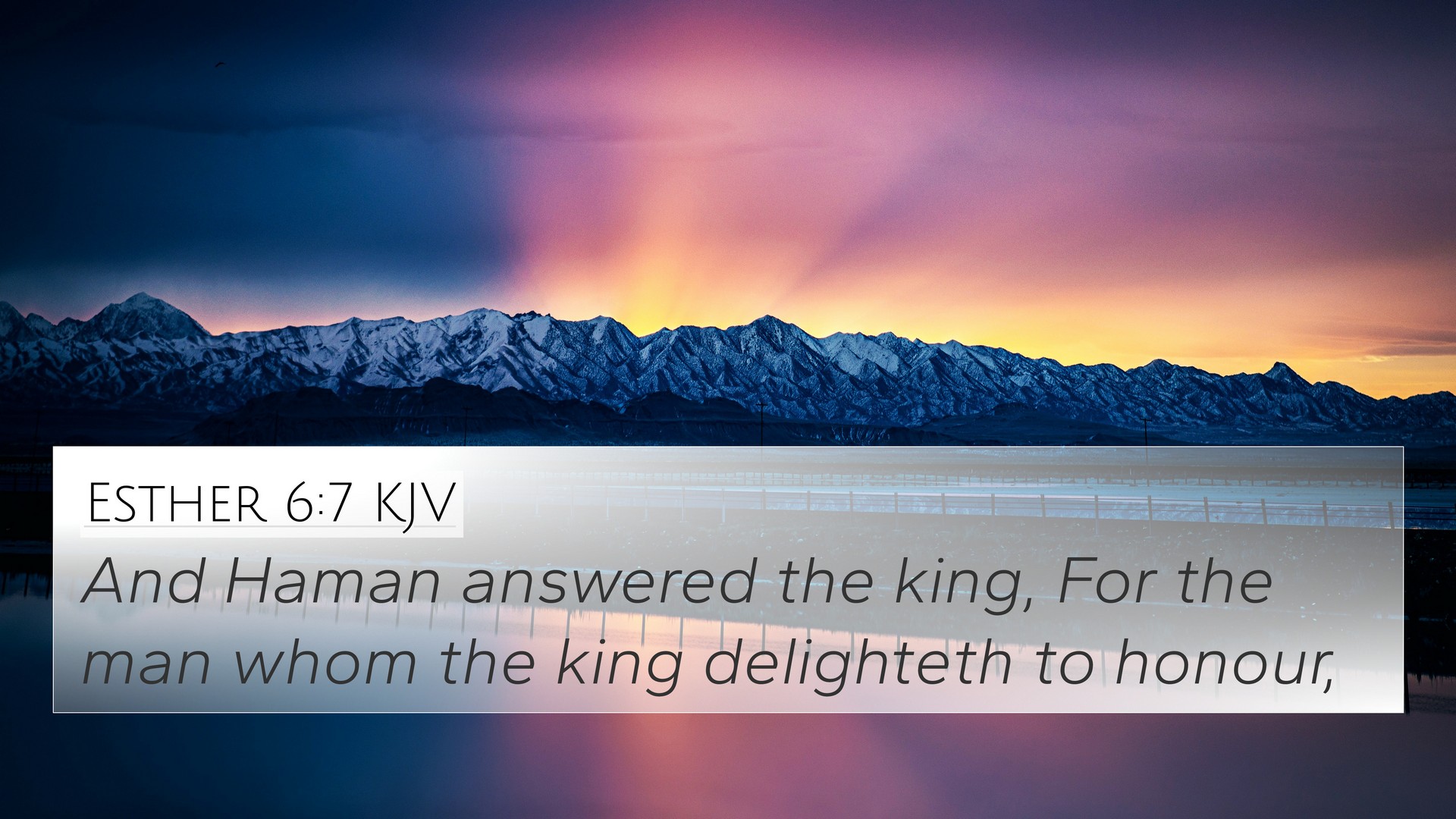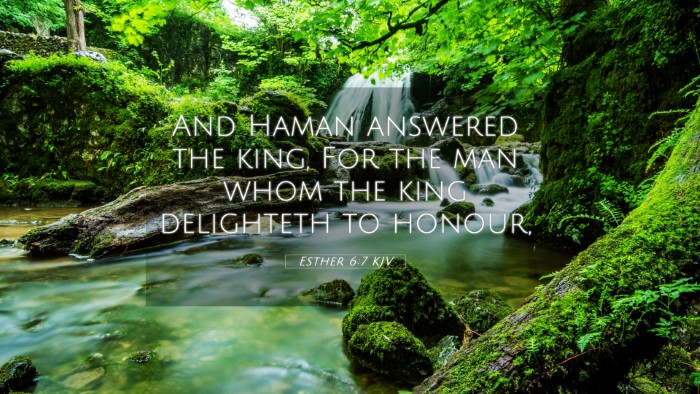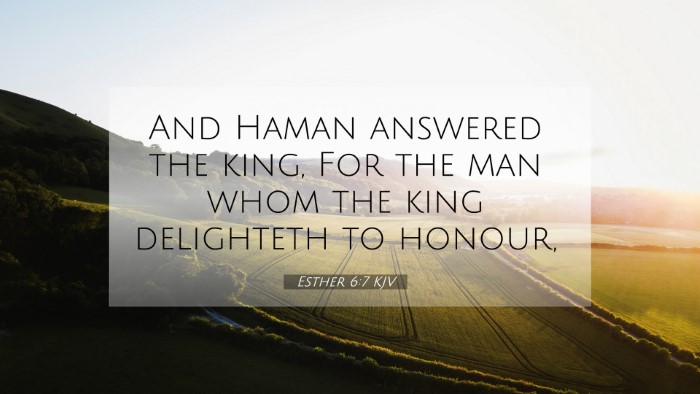Old Testament
Genesis Exodus Leviticus Numbers Deuteronomy Joshua Judges Ruth 1 Samuel 2 Samuel 1 Kings 2 Kings 1 Chronicles 2 Chronicles Ezra Nehemiah Esther Job Psalms Proverbs Ecclesiastes Song of Solomon Isaiah Jeremiah Lamentations Ezekiel Daniel Hosea Joel Amos Obadiah Jonah Micah Nahum Habakkuk Zephaniah Haggai Zechariah MalachiEsther 6:7 Similar Verses
Esther 6:7 Cross References
And Haman answered the king, For the man whom the king delighteth to honour,
Uncover the Rich Themes and Topics of This Bible Verse
Listed below are the Bible themes associated with Esther 6:7. We invite you to explore each theme to gain deeper insights into the Scriptures.
Esther 6:7 Cross Reference Verses
This section features a detailed cross-reference designed to enrich your understanding of the Scriptures. Below, you will find carefully selected verses that echo the themes and teachings related to Esther 6:7 KJV. Click on any image to explore detailed analyses of related Bible verses and uncover deeper theological insights.
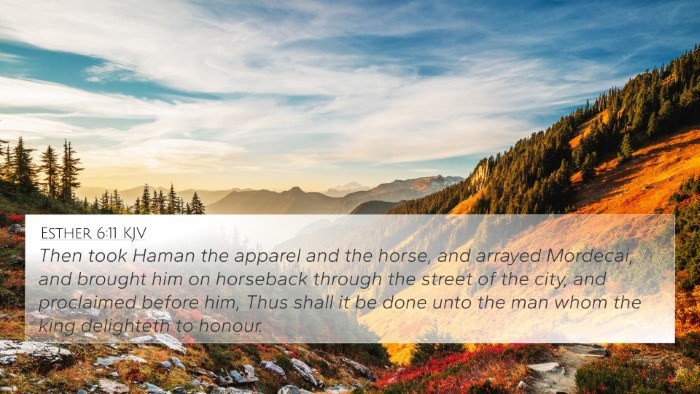
Esther 6:11 (KJV) »
Then took Haman the apparel and the horse, and arrayed Mordecai, and brought him on horseback through the street of the city, and proclaimed before him, Thus shall it be done unto the man whom the king delighteth to honour.
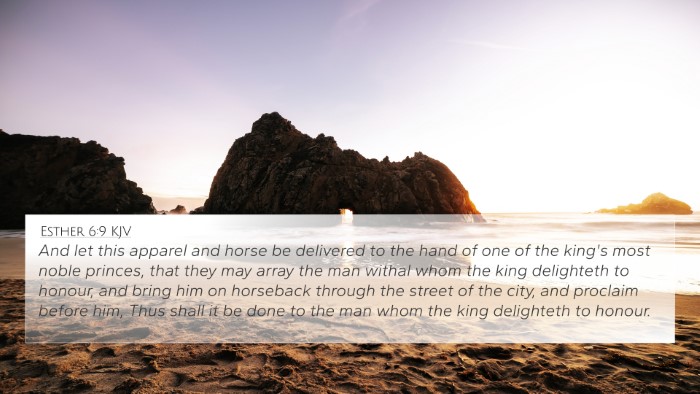
Esther 6:9 (KJV) »
And let this apparel and horse be delivered to the hand of one of the king's most noble princes, that they may array the man withal whom the king delighteth to honour, and bring him on horseback through the street of the city, and proclaim before him, Thus shall it be done to the man whom the king delighteth to honour.
Esther 6:7 Verse Analysis and Similar Verses
Understanding Esther 6:7
Esther 6:7 presents a pivotal moment in the narrative of Esther, where the attentive implications of pride, self-importance, and divine providence come to the forefront. This verse is essential for understanding Haman's character and the unfolding of events that lead to his downfall.
Verse Analysis
This verse states: "And Haman said unto the king, For the man whom the king delighteth to honour, let a royal apparel be brought, which the king useth to wear, and the horse that the king rideth upon, and the crown royal which is set upon his head." Here, Haman, filled with selfish ambition and pride, makes extravagant suggestions for honoring what he assumes will be himself.
Key Themes
- Pride and Ambition: Haman's desire to elevate his status is indicative of the destructive nature of pride.
- Divine Providence: The irony lies in the fact that Haman is unknowingly outlining a plan for someone he despises.
- Recognition and Honor: This reflects the human desire for acknowledgment and the lengths individuals go to secure it.
Commentary Insights
According to Matthew Henry, this verse is a clear portrayal of how pride can blind a person's judgment. Haman, believing he is destined for great honor, fails to recognize the hand of God at play in the events surrounding him. His elaborate ideas serve as a foreshadowing of his own fate, demonstrating the biblical principle that "pride goes before destruction" (Proverbs 16:18).
Albert Barnes comments on the absurdity of Haman's suggestion, emphasizing how God often uses the very plans of the wicked to bring about their demise. Haman's expectation of honor stands in stark contrast to the reality that he will be the one ridiculed by his own proposal when the king honors Mordecai instead.
Adam Clarke elaborates on the use of royal apparel and the steed of the king, indicating that Haman, in his self-centered ambition, requests a display of supremacy that ultimately leads to his disgrace. Clarke points out the significant contrast between Haman's intentions and God's orchestrated outcome.
Cross-References
This verse can be related to several other biblical passages that reflect similar themes:
- Proverbs 16:18: "Pride goes before destruction, and haughtiness before a fall."
- Esther 7:10: "So they hanged Haman on the gallows that he had prepared for Mordecai."
- Daniel 4:37: "Now I, Nebuchadnezzar, praise and extol and honor the King of heaven, for all his works are right and his ways are just; and he is able to humble those who walk in pride."
- Luke 14:11: "For everyone who exalts himself will be humbled, and he who humbles himself will be exalted."
- James 4:10: "Humble yourselves before the Lord, and he will exalt you."
- Matthew 23:12: "Whoever exalts himself will be humbled, and whoever humbles himself will be exalted."
- Galatians 6:7: "Do not be deceived: God is not mocked, for whatever one sows, that will he also reap."
Application and Reflection
As readers engage with Esther 6:7, it invites reflection on the implications of one's desires and ambitions. The theme of divine irony speaks to the broader concept that God often turns the plans of the proud against them.
In a world where recognition provides validation, this verse encourages humility and warns against the perils of pride. The lives we lead should reflect humility, service to others, and an acknowledgment that true honor comes from fulfilling God's purpose rather than seeking personal glory.
Conclusion
In essence, Esther 6:7 offers profound lessons on the nature of honor and pride. As believers explore these connections through detailed cross-referencing, they gain deeper insight into God's sovereignty and the inevitable outcome of prideful ambitions.
By engaging with this verse and its surrounding texts, individuals can develop a more profound understanding of biblical themes and their relevance to everyday life.
